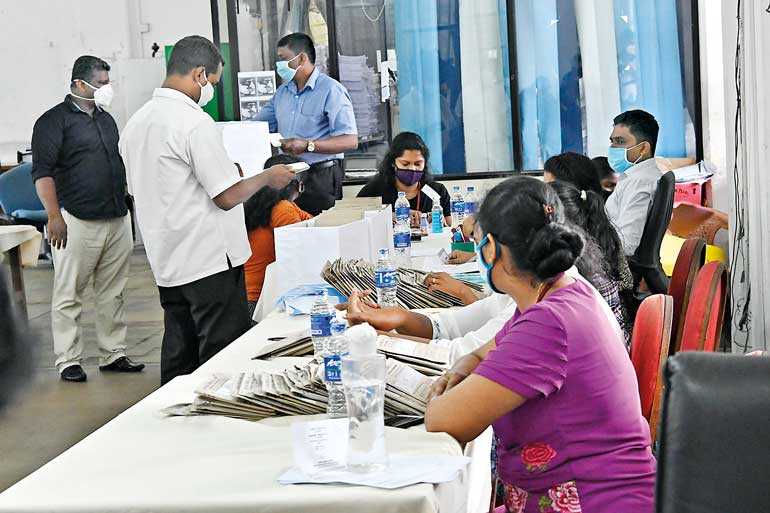Friday Feb 20, 2026
Friday Feb 20, 2026
Tuesday, 11 August 2020 00:00 - - {{hitsCtrl.values.hits}}

The politicians and the Government servants of this country are concerned about the privileges they get and the people are concerned about the relief they get. All of them live by mortgaging the future generation – Pic by Shehan Gunasekara
The new government will have to face the serious task of reviving the economy. Those who governed the country after the independence, those who were in the opposition during that period and the people who have voted in the elections from the independence are responsible for the economic plight of the country.
There is a Sinhala saying that the mansion is according to the devil. As a person who voted from 1977, I feel that I am also responsible for this. This article is written in that point of view.
The economy was already in a bad shape but it was aggravated after COVID-19. There were deficits, which means the expenses of the Government were more than its income, in the Government budget from the independence except for two years where M.D.H. Jayawardena was the Minister of Finance. The deficits were met by the domestic and foreign borrowings.
If the excessive expenses were of the capital nature and those investments generated adequate returns resulting in an expansion of the economy it would have been a gainful act since the burden would not have been felt when the debts were repaid.
On the other hand, if the excessive expenses were of the recurrent nature which means the expenses for consumption or there are no adequate returns of the capital expenses it would be a burden to repay the debts. Sri Lanka faces this situation today.
Budget deficits
Budget deficits keep on increasing at the election years in Sri Lanka. This is a common phenomenon under all the governments. In recent times it happened in 2015 as well. Although there were various arguments the prime reason for this was to bribe the voters officially. People also like this. That was the reason we had the promises such as bring rice even from the moon. There were such promises in this election as well.
The other main reason for a deficit budget is reduction of Government revenue. The main component of Government revenue is tax income. During the period of the government up to 2014 government revenue in relation to Gross Domestic Production (GDP) was dropped. At that time there were various concessions to the business community.
The previous Government increased the taxes and took away certain tax concessions in order to consolidate the weakening fiscal situation of the country. Thereafter, the Government account started to improve but there were hardships to the business community. This Government has taken off the increase taxes and thereby the Government revenue dropped drastically prior to the COVID-19 disaster.
The Government gets around 80% of its tax income from indirect taxes whereas only 20% comes from direct taxes. The beggar as well as the affluent person equally pay the indirect tax. Direct taxes are paid by those who can pay. In India as well as in Singapore around 50% of the tax revenue is from direct taxes. The Government hopes to promote investments by reduction of direct taxes. It is to be investigated whether this hope was materialised.
The Gini coefficient indicates the disparity of the income distribution of a country. An increase of Gini index means an increase of the disparity of income distribution. In 1988 Gini Index of Sri Lanka was 32 and in 2016 it was 39.8. In most of the countries other than Scandinavian countries the Gini Index is high.
The most suitable economic model for Sri Lanka is social market economy which was accepted by the previous Government as a principle but was not implemented. The benefit of this is that there would be an adequate social cover for vulnerable segments such as unemployed and elderly people. The President sometime before assuming duties mentioned that he would follow socialist market economy. This is applicable for a country like China and not for us.
The trade balance of the country is continuously unfavourable which means the import expenses are more than the export income. The deficit is met with the foreign reserves of the country. These foreign reserves are mainly comprising of the foreign loans. Export income dropped drastically during the government till 2014 and the previous government also failed to bring it back to the level it was.
Japan is the country which is having highest ratio of debt to GDP which is 237%. Japan is having a budget deficit as well which was very high previously and now it was brought down to the level of 3.7% in 2018. Japan from the government budget spends on social security, education and infrastructure soft and hard which facilitate their businesses. Majority of public debt of Japan is domestic debt since the domestic savings is high.
Japan is having an excess of the current account which includes the balance of the trade account. In 2017 the excess was second only to Germany. The reason for this is the export income and the foreign remittances. Therefore, the issue is when there are deficits in the government budget, trade balance or current account with excessive public debt. Sri Lanka is in such a situation. Another country in this category is Greece.
Public sector
The public sector of Sri Lanka is comparatively large. Government business entities incur losses due to undue political interference and inefficient management. Politicians continue to maintain these institutions to provide employment to their henchmen and to exercise power through these institutions. People want to get employment in those institutions through politicians without proper qualifications and due to so-called patriotism which was implanted in them by the very politicians.
If the Government can sell these institutions by calling proper tenders or if those institutions can be managed by an independent authority which can ensure zero political influence the burden of those institutions to the Government budget can be minimised.
There are unnecessary appointments in Government departments as well. Those who govern and those who are governed equally like this situation. Those who govern give appointments with an eye of the elections. Those who are governed like public sector jobs since they are entitled to an un-contributory pension scheme and more importantly they can work less compared to the private sector. Some join the public sector by abandoning higher paying private sector jobs. This situation is a burden to the national economy.
The driving force of the national economy is the banks. The two largest banks in Sri Lanka, Bank of Ceylon and People’s Bank are State banks. These banks are inefficient compared to the private sector banks. The people of this country pay for this inefficiency and hiding behind that inefficiency the private banks earn profits. If the Government either privatises these two banks or ensures that those are run efficiently without political influence there will be a reduction of excessive profits of the banking industry in this country and it will be beneficial to the businesses and the people.
Out of the top 10 companies in Sri Lanka there are four banks and out of the top 20 companies there are seven banks. In India corresponding figures are one and three and in United States it is one and two. In a progressive country there should be more manufacturing companies with in the top 10 or 20 companies, not banks. Out of those companies also the majority should be export companies.
Doing business
If a country is to progress on the economic front there should be respect for the business entities of the people of that country. People of this country think that businesses are run by cheaters. They respect the officers of the armed forces or the medical officers more than the businessmen.
Without uplifting the Small and Medium-scale Enterprises (SMEs) it would be difficult to uplift the economy of this country. Producing doctors or engineers or accountants alone would not be sufficient to take the economy forward since they are not the driving force of the economy. The Government and the various institutions should facilitate these SMEs and there should be due recognition form the people for them. This recognition does not come from a set who like to spend time in vain.
Foreign Direct Investments are not coming to the country due to the inefficient cluster of institutions, commission mafia, policy inconsistency and the perception of the absence of rule of law. Also, it would be disadvantageous for investors to come here for industries with low technology if the workers are paid comparatively higher salaries and they have the legal right to strike. Similarly, they would not invest in industries with high technology if the workforce is not competent enough to handle it. Therefore, they would go to Bangladesh or to Vietnam. Both countries were behind us.
Universities in our country should produce not only academics but also professionals in various fields. Reactionary political parties and the student community do not promote modernisation of the universities. They even support ragging of the newcomers which eventually turns them into a bunch of imitators. Welivitiye Soratha Thero, the first Vice Chancellor of the Vidyodaya University, said that the students should be revolutionaries, of course ideologically. Education should take the lead in economic development.
The Government which was in power up to 2014 attempted to increase the economic growth by construction and services. It appears to be that the policy of the present Government is to restrict imports and promote local producers. There is no question that we need an economy based on production. However, it should not be associated with so-called patriotism.
Imports are needed for exports as well as for the products which cannot be manufactured here economically. Also, through the import restrictions there can be a promotion of inefficient industries which prevailed during the 1970-1977 era. Local industries should aim not only for the 20 million local market, they should aim for the unlimited export market as well. That is why exports are more important than import substitutions.
The entrepreneurs especially the SMEs pay less attention to the quality of the goods and services they produce. Some of them do away with long-term continuity of the businesses in exchange for short-term gains by sacrificing the quality. A country should produce entrepreneurs who preserve the quality of the goods and services produced by them.
In this hour a lot of people request strong leadership. Businesses cannot be promoted as fighting wars. For that there should be a change of attitudes of the people as well as a change of facilities provided by the Government and its policies. There should be a democratic approach for this since the so-called strong governments of this country ended up in making disasters for the country, the people and themselves.
The politicians and the Government servants of this country are concerned about the privileges they get and the people are concerned about the relief they get. All of them live by mortgaging the future generation. People should live to work rather than work to live. If working can be the passion of life a person can live to work. We need this type of people to uplift the economy. The Buddha lived to work and not worked to live.